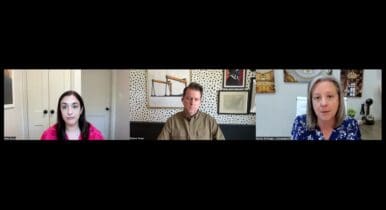Three Trends Shaping the Politics Business Right Now
The business of politics has changed a lot over the past couple of decades. And while the fundamentals may be the same, a tidal wave of outside forces are reshaping what it means to be a campaign professional in 2025.
Campaigns & Elections convened a panel last week in partnership with the George Washington University School of Media and Public Affairs to ask veteran and emerging political pros about how the business of politics is changing and what’s behind those changes. The conversation featured SKDK CEO Doug Thornell, Targeted Victory Vice President Celia Bote and GWU political communications student Jacob Khabie.
Here’s are some of their thoughts on the forces shaping the politics business right now:
The Demand for Content
For all the changes rippling through the politics business, Thornell said that the fundamentals haven’t changed all that much. Campaigns, he said, “still need a message, you still need to mobilize, persuade, turn people out, and you still need to have media.”
But that media environment is more demanding than ever, requiring campaigns to produce more and more content in order to compete in an increasingly crowded online ecosystem, Thornell said.
“The desire for content has exponentially increased, both organic and paid, so campaigns really have to be able to scale that in a way that 15 years ago they probably didn’t need to,” he said, later adding that “campaigns are trying to figure out how they can be more of, basically, media companies in some respects.”
“How do you distribute more and more of this content on all the different screens where people consume it?” he said.
That demand for content is already forcing campaigns to look for new allies in the digital creator space.
“I think that when you’re looking at the creator world, that’s something that really hadn’t existed five years ago in terms of the campaign world. And now you’re seeing campaigns bring on what they call creator partnership directors – people whose whole job is just to build relationships with these creators,” Thornell said.
Consolidation and Private Equity
Corporations and private equity groups have snatched up a growing number of consulting and public affairs firms in recent years, hoping to get in on the tidal wave of money that has washed into the politics business.
In some cases, that trend has ruffled some feathers. Many Democrats, for example, are still sore over NGP VAN’s acquisition in 2022 by the private equity firm Apax Partners, arguing that it’s not appropriate for a private equity group to own such an important piece of the party’s infrastructure.
But according to Bote, the move towards consolidation in the industry isn’t necessarily a bad thing.
“From what I’ve seen, I think it’s helped in professionalizing the industry,” said Bote. Her firm, Targeted Victory, is partially owned by the holding company Stagwell Media LLC, which also owns Thornell’s firm, SKDK.
“For somebody who does want to live sort of in this D.C. environment, New York media environment, that you have sort of the security of a company and the resources of a company, like a Stagwell or an Omnicom or a GP3, that can bring more stability into the industry,” Bote said.
Artificial Intelligence
AI is already reshaping entire industries, and the politics business is no exception.
Thornell said that SKDK began experimenting with the emerging tech about a year and a half ago, and is currently using it for tasks like research, storyboarding and testing ad spots. And as AI improves and becomes integrated into more and more political work, Thornell said that it’ll be necessary for up-and-coming practitioners to know how to use the technology.
“I think the most important thing for folks who are in college right now and looking for a career in politics is that they’re very curious and interested in AI,” he said. “They don’t need to be engineers and tech experts. But they do need to know how to use it in a way that’s going to help them do things faster.”
The idea, he said, is to look at AI as a “tool and as a way to make people’s daily lives at work more efficient.” And while there’s a chance that the technology could eventually cost people their jobs, there’s still a need for the human element in campaign work.
“You’re not seeing a significant drop right now in bodies on the campaigns. That certainly may happen, but there is still a premium in our world as consultants and strategists that clients put on smart people who have experiences who can be in a room and advise them how to navigate very challenging situations,” Thornell said.
“There are no robots right now who are going into communities and meeting with pastors and business leaders and all these folks that you need to have actual relationships with,” he added.


